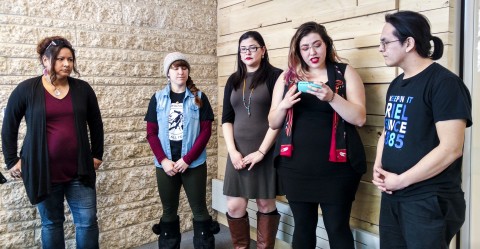
Danielle Bird, Iloradanon Efimoff, Monica Iron, Gabriella Lee and Regan Ratt-Misponas held a meeting with the media in the Gordon Oaks Red Bear Student Centre.
A week after the Indigenous Students’ Council first released an official statement calling for non-participation from all Indigenous students in administrative bodies at the University of Saskatchewan, the administration and the ISC have begun to respond publicly.
On March 7, the ISC hosted a town-hall meeting to discuss the direction that the ISC should pursue as they work to establish an autonomous union, and they respectfully asked that only Indigenous students attend. At the time of publication, the students had not had contact with any university administration officials besides Jackie Ottmann, vice-provost of Indigenous engagement at the U of S, in a private meeting held on March 1.
At a press conference held on March 6, student representatives spoke with the media to clarify their aims in pursuing an Indigenous Students’ Union. Gabriella Lee, from Pelican Lake First Nation, explained that, although Indigenous students are seated on U of S councils and administrative bodies, the feedback given by those students is not retained by the university in a way that enables progression toward the goals of those students.
“We don’t have an institutional memory that can maintain the interests of our Indigenous students’ body at the level of a union or maintain those conversations … after the four-year turnaround of our students,” Lee said. “We don’t have somebody who’s maintaining that conversation for us, so this Indigenous Students’ Union will be that platform from which we can have meaningful, ongoing collaborations with the U of S Students’ Union and the university itself.
The ISC has received support from other Indigenous groups on campus, such as the Indigenous Graduate Students’ Council and the Saskatchewan Urban Native Teacher Education Program, also known as SUNTEP, through official statements released on their respective Facebook pages. Both groups have expressed solidarity with the ISC and hope to move forward on pursuing an autonomous governing body for Indigenous students.
In the fall of 2017, Regan Ratt‑Misponas, president of the ISC, approached the Indigenous Student Affairs Committee of the USSU to discuss the creation of an Indigenous Students’ Union. David D’Eon, president of the USSU, discusses how he explored the possibility of an autonomous body at that time but does not believe it is possible to implement based on the legal restrictions of the USSU.
“There is no legal mechanism for someone to opt out of a union,” D’Eon said. “I don’t know any way that that could be done, legally [or] logistically… There [are] too many questions around that.”
While D’Eon is not against the creation of an Indigenous Students’ Union, he notes that the only way that the U of S currently has to identify Indigenous students is by self-declaration on the PAWS website, which could pose a problem. He notes that the ability to opt in and opt out of the USSU could be detrimental for the stability of the undergraduate union and the services they provide.
“Our only mechanism for knowing if there is an Indigenous student on campus is if they self-declare. So, it is an optional thing to do in the first place, and there’s no actual mechanism to control that. It gives an opt-out option entirely to everyone, which is why it’s legally not possible, and there [are] a lot of ramifications in opting out of the USSU. [You could] lose your insurance, lose your bus pass [and] lose access to undergraduate services.”
The U of S has no reason to oppose students seeking self-governance, Ottmann explained during a press conference held shortly after the ISC’s press meeting.
“In terms of how unions emerge, to a large degree, that’s outside administrative control, and how they lead and govern themselves is outside our control,” Ottmann said. “We can support, we can facilitate, but we can’t go to one of our unions and say, ‘We’re mandating you to do this.’”
As for Lee, she says that there is a need for Indigenous students to self-govern, as their input is necessary to decolonizing efforts at the U of S and in the wider community.
“We want to be able to moderate, mediate and facilitate the conversations around Indigenization and reconciliation ourselves, because the inherent worldview that is intrinsically implied by the involvement of Indigenous people is the [perspective] needed for these frameworks to actually be effective … in our curriculum and … our society.”
—
Nykole King / News Editor
Photo: Jessica Klaassen-Wright / Editor-In-Chief
Leave a Reply